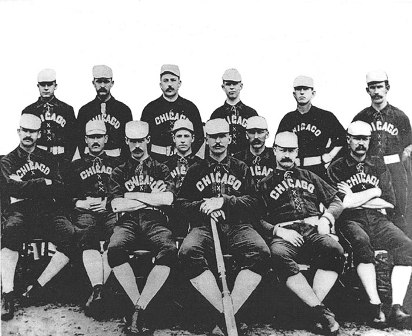“Leather –Fisted Phil” is what Phillip J. Powers was called in his 1914 Associated Press obituary which said:
“(Powers) was famous for his ability to stop the swiftest throws of the league’s star pitchers.”
He most likely earned the nickname in 1877 when, like many other catchers of the era, he began using a small, leather pad on his hand while with the London Tecumsehs of the International Association.
After the London team disbanded in August of 1878 Powers joined the Chicago White Stockings. According to The Chicago Inter Ocean:
“He is a tall young fellow…He is described as a good catcher, but liable to get hurt, fair at the bat, and a genial man on the grounds.”
Powers would spend parts of seven seasons and 155 games in the National League and American Association with the Boston Red Stockings, Cleveland Blues, Cincinnati Red Stockings and Baltimore Orioles, hitting .180. In between his engagements as a player Powers was an umpire.
It was as an umpire that he made a name for himself, but it probably wasn’t what he had in mind. Few umpires, even in an era when members of the “profession” were poorly trained and underpaid, were the target of as much criticism as Powers.
In 1881 he began the season as a National League umpire. By July he had become a target in several cities,
The Detroit News said:
“Phil Powers has acquired reputation enough in the last two weeks to last him a lifetime. The erroneous umpiring he did here, people were inclined to regard as errors of judgment, but to say the least his ‘mistakes’ have become so numerous that his utter unfitness for the position he holds is unquestioned.”
The Cleveland Plain Dealer took the criticism even further:
“Powers is said to have been offered $150 to play ball (for the Detroit Wolverines) for one month, but refused it. As an umpire he cannot, if square, earn more than $15 or $20 a week and expenses; and must take the chance at that of being chosen an umpire. He preferred to be an umpire. Several of his decisions on Saturday were grossly unfair, and, what is worse, they bore heavily on Cleveland. They were so one-sided that many of the spectators believed he deliberately purposed to give the game to Troy.”
Despite the ill feelings in Cleveland, Powers joined the Blues in August and caught five games for the team after Michael “Doc” Kennedy was injured and John Clapp was “called away by an illness in his family.” He finished the season with the New York Metropolitans in the Eastern Championship Association.
Powers again became a full-time player from 1882-1885, and was part of the Red Stockings American Association championship team in 1882. He was released by Cincinnati in July of 1885, signed with the Baltimore Orioles and was again released the following month.
Powers was signed by the St. Louis Browns in the spring of 1886, but released before the beginning of the season, and was added to the National League umpiring staff in August. He again worked as an umpire through the 1887 season, left to return to London, Ontario to manage the Tecumsehs in the International Association, but again returned to the National League as an umpire in August of 1888. He came back just in time to find himself in the middle of a controversy involving two Hall of Famers.
New York Giants catcher/captain William “Buck” Ewing was hit on the wrist by a ball during a game with the White Stockings in Chicago. In 1888 the opposing team’s captain had to agree that an injury was serious to necessitate a substitution; Chicago’s “Cap” Anson said he did not agree to a substitution when backup catcher “Big Bill” Brown entered the game in the 6th inning. Anson appealed to the umpire, and according to The Chicago Inter Ocean, “(Powers) said that Captain Ewing was not so badly hurt that he could not play.”
After a heated argument, during which The Inter Ocean said Ewing acted “in a childish and fatuous manner,” Powers declared the game “forfeited to Chicago by a score of 9 to 0.”
Powers had been involved in a similar situation in 1886, refusing to allow Philadelphia Quakers catcher “Deacon” McGuire to leave a game after an injury. The Chicago Tribune said Quakers captain Arthur Irwin “told McGuire to catch ‘away back’ (from the plate).” The Tribune said Irwin’s actions created a “scene” and “pandemonium reigned,” until Anson agreed to allow Philadelphia to replace McGuire. White Stockings President A.G. Spalding “preferred charges against umpire Powers” for losing control of the game.
The substitution rule was changed in 1891, putting an end to controversies regarding the replacement of injured players.
But controversies involving Powers continued. More on Monday.




7 Responses to ““Leather-Fisted Phil””